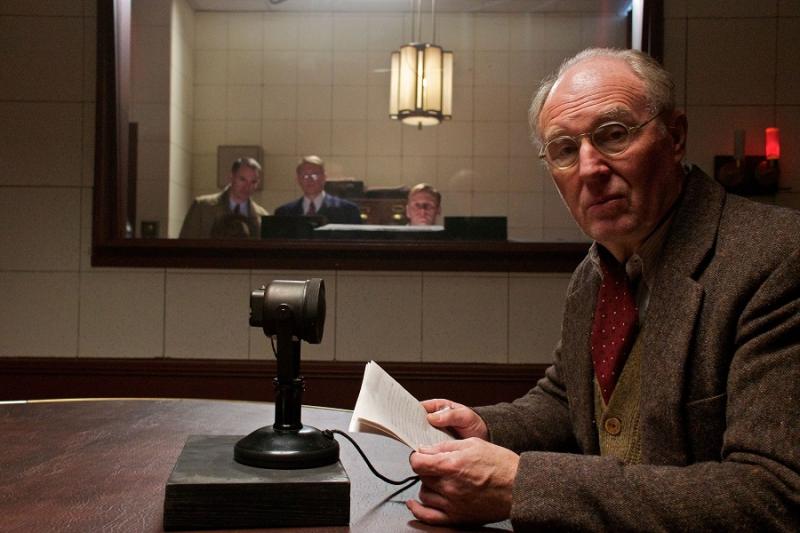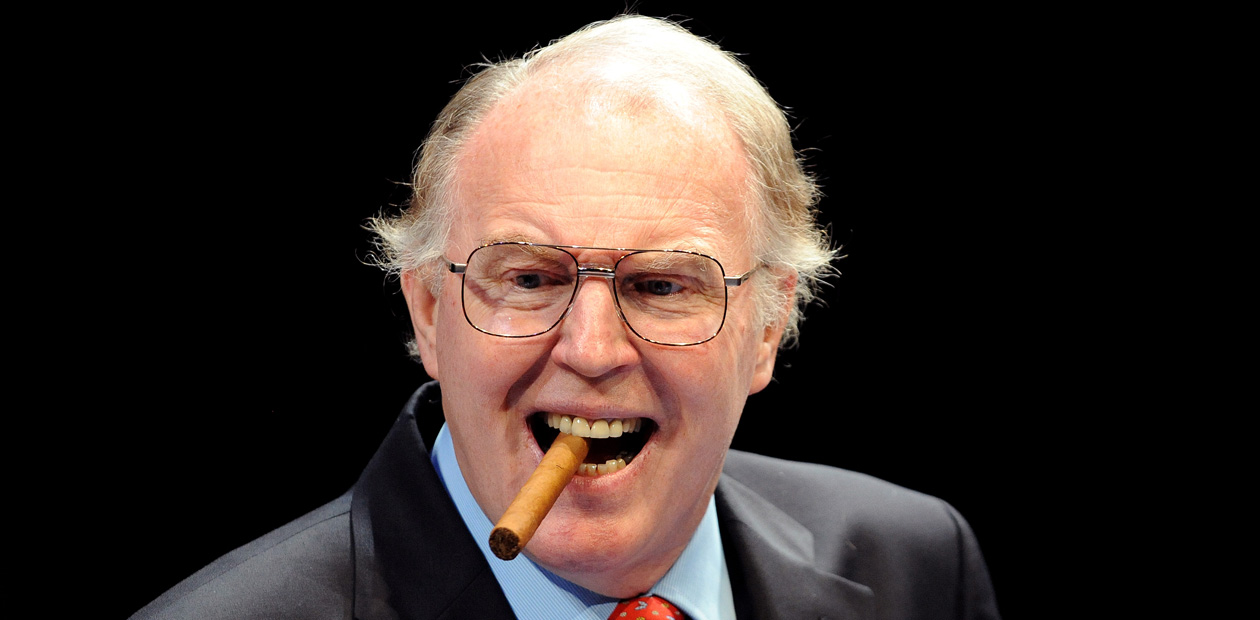Tim Pigott-Smith: from The Jewel in the Crown to King Charles III | reviews, news & interviews
Tim Pigott-Smith: from The Jewel in the Crown to King Charles III
Tim Pigott-Smith: from The Jewel in the Crown to King Charles III
The actor played pillars of the establishment, but there was much more to him than that

It is the fate of a certain type of well-spoken classically trained actor to wear the livery of the English Establishment. Tim Pigott-Smith, double-barrelled and tall with a high forehead, was one such. But the full arc of his career encompassed vast breadth: he was a gifted tragedian, and a nifty comedian.
“In television I was first cast as a cavalry officer because of my name,” he told me when I interviewed him in 2015. He brought an air of entitlement to the PM in Johnny English, the Foreign Minister in Quantum of Solace, various higher-ups in various uniforms in The Chief, The Vice, The Hour and Bloody Sunday. And of course he presided of an extremely weepy Sunday as a posh obstetrician attending to the death of Lady Sybil in Downton Abbey. In Wodehouse: An Innocent Abroad (pictured above) he played the giant of comic letters as he underwent the trauma of war which alienated him for good from the country his work celebrates. “He was a fantasist and an escapist and an eternal schoolboy.” And for that reason, a gift to play. Pigott-Smith gave a delightful performance as a great comedian suffering a personal tragedy. His final role was a little comic gem, as junior dean Mr Sniggs in Decline and Fall, the college nabob who is eager for the posh young hooligans of the Bollinger Club to ransack the chapel so that they can raise ever steeper fines.
In Wodehouse: An Innocent Abroad (pictured above) he played the giant of comic letters as he underwent the trauma of war which alienated him for good from the country his work celebrates. “He was a fantasist and an escapist and an eternal schoolboy.” And for that reason, a gift to play. Pigott-Smith gave a delightful performance as a great comedian suffering a personal tragedy. His final role was a little comic gem, as junior dean Mr Sniggs in Decline and Fall, the college nabob who is eager for the posh young hooligans of the Bollinger Club to ransack the chapel so that they can raise ever steeper fines.
Pigott-Smith’s status one of British television’s hardy perennials goes all the way back to the early Seventies and Doctor Who, but he was under no illusions about the performance which is singed into the collective memory: his lower-middle police officer Ronald Merrick in Granada’s epic The Jewel in the Crown (pictured below), based on Paul Scott’s Raj Quartet. Nearly 30 years on he recalled that there was nothing on the page to reveal the character’s inner life. “We talked about how somebody from that class might have a slightly jutting jaw. That put a look of contempt on my face and that was the key because he’s spent his life being despised by the British upper class and he passes on that contempt to everybody below him including the Indians. “The funny thing is it wasn’t all there in the book. In those four amazing books you don’t really get one insight in Merrick and I think it’s intentional the way he’s written it. You never know what’s going on inside him. You don’t even get a solution at the end. You’re turning the page to think, what’s making him tick? So I found it quite difficult to get inside that. I went to see a criminal psychologist. He was very helpful and then we had a fantastic woman called Liz Percy who came in to teach us about class and accent. We talked about how somebody from that class might have a slightly jutting jaw. It was the way I used to get into character, just sit in front of the mirror and push my jaw forward and that put a look of contempt on my face. And that was the key to the character because he’s spent his life; being despised by the British upper class and he passes on that contempt to everybody below him including the Indians.”
“The funny thing is it wasn’t all there in the book. In those four amazing books you don’t really get one insight in Merrick and I think it’s intentional the way he’s written it. You never know what’s going on inside him. You don’t even get a solution at the end. You’re turning the page to think, what’s making him tick? So I found it quite difficult to get inside that. I went to see a criminal psychologist. He was very helpful and then we had a fantastic woman called Liz Percy who came in to teach us about class and accent. We talked about how somebody from that class might have a slightly jutting jaw. It was the way I used to get into character, just sit in front of the mirror and push my jaw forward and that put a look of contempt on my face. And that was the key to the character because he’s spent his life; being despised by the British upper class and he passes on that contempt to everybody below him including the Indians.”
The role took 18 months to film, and for a long while after Pigott-Smith was sent scripts asking for a repeat performance. “I just got typecast as a baddie. In one week I was offered three disabled parts because Merrick had lost his arm. It was the only period of time when I didn’t work.”
But there’s no doubt about the long-term dividend. When the London production of The Iceman Cometh was heading for Broadway with Kevin Spacey, Pigott-Smith was allowed by American Equity to continue playing an American character was “probably down to the fact that in America I’m better known for Jewel in the Crown than I am here. It plays all the time on PBS.”
He has never watched it since apart from once when he accidentally caught it while channel-hoping at home when waiting for a taxi “and I thought, who’s that bloke? I recognise him. And it was me.” When Lucy Prebble’s hit play Enron (pictured above by Tristram Kenton) went to Broadway Pigott-Smith – who played the Enron chief Kenneth Lay - was part of the star cast which missed out. “They thought taking the English cast would exacerbate the problem that it would be seen as English criticism of a way of life.” The play closed within days of its slating in the New York Times. To prepare for the role he watched the documentary The Smartest Guys in the Room. “He was such a dull faceless man I thought I’m certainly not going to play it like that, so I actually based it on John Huston who I did the terrible football film Escape to Victory as a young actor in 1980.”
When Lucy Prebble’s hit play Enron (pictured above by Tristram Kenton) went to Broadway Pigott-Smith – who played the Enron chief Kenneth Lay - was part of the star cast which missed out. “They thought taking the English cast would exacerbate the problem that it would be seen as English criticism of a way of life.” The play closed within days of its slating in the New York Times. To prepare for the role he watched the documentary The Smartest Guys in the Room. “He was such a dull faceless man I thought I’m certainly not going to play it like that, so I actually based it on John Huston who I did the terrible football film Escape to Victory as a young actor in 1980.”
Having missed out on Broadway, Pigott Smith consoled himself by playing King Lear at the West Yorkshire Playhouse. “I was able to have a real crack at it and I was very proud of it,” he said. “And I’m not proud of much stuff.”
He played another fictional English king in King Charles III, Mike Bartlett’s future history play which imagined what might happen when a long-serving heir to the throne, upon accession, invokes the royal prerogative to interfere with the workings of Parliament. Pigott-Smith embodied the real Prince of Wales’s anxiety and thwarted desire to act to convey a genuine sense of tragedy. He and the whole production were a triumph on Broadway. He was to have started as Willy Loman in Death of a Salesman this coming week.
The future of Arts Journalism
You can stop theartsdesk.com closing!
We urgently need financing to survive. Our fundraising drive has thus far raised £49,000 but we need to reach £100,000 or we will be forced to close. Please contribute here: https://gofund.me/c3f6033d
And if you can forward this information to anyone who might assist, we’d be grateful.

Subscribe to theartsdesk.com
Thank you for continuing to read our work on theartsdesk.com. For unlimited access to every article in its entirety, including our archive of more than 15,000 pieces, we're asking for £5 per month or £40 per year. We feel it's a very good deal, and hope you do too.
To take a subscription now simply click here.
And if you're looking for that extra gift for a friend or family member, why not treat them to a theartsdesk.com gift subscription?

Add comment